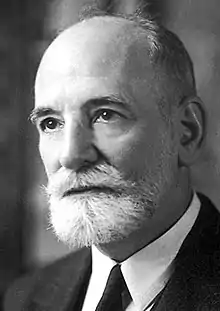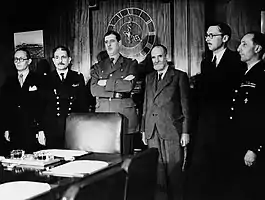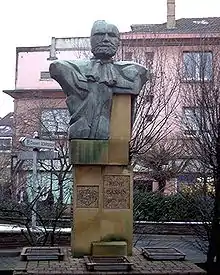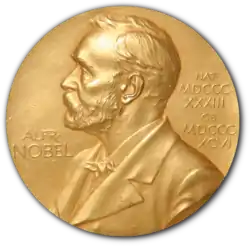René Cassin
René Samuel Cassin (5 October 1887 – 20 February 1976) was a French jurist known for co-authoring the Universal Declaration of Human Rights and receiving the Nobel Peace Prize.
René Cassin | |
|---|---|
 René Cassin portrait from his Nobel Prize | |
| Born | René Samuel Cassin 5 October 1887 |
| Died | 20 February 1976 (aged 88) Paris, France |
| Occupation | French jurist, law professor and judge |
| Known for | Advocacy for Human Rights |
Notable work | Universal Declaration of Human Rights |
| Awards | Nobel Peace Prize (1968) |
Born in Bayonne, Basque Country, the son of a French-Jewish merchant, he served as a soldier in World War I. He formed the Union Fédérale, a leftist, pacifist organisation for veterans. During the Second World War he served in the Free French government-in-exile in London and between 1944 and 1959 was a member of the Council of State.
Refusing the ceasefire, René Cassin embarked on a British ship, the Ettrick, in Saint-Jean-de-Luz on June 24, 1940 and joined General Charles de Gaulle in London to help him continue the war against Germany. He was, therefore, one of the first to join him.[1] As a result, the Vichy regime pursued him for treason before the military tribunal. Clermont-Ferrand military, exceptional jurisdiction, which condemned him to death and deprived him of his French nationality in absentia.[2]

As the head of the legal service of Free France, member of the Empire Defense Council, when it was created in October 1940, he wrote the statutes of free France, to thwart the legal French government. René Cassin did not speak English but already knew leading academics and political figures, like Foreign Minister Anthony Eden.[3]He negotiated these statutes with Winston Churchill who signed the agreement between General de Gaulle and the United Kingdom on August 7, 1940, recognizing Free France as the only organization qualified to represent France at war and securing the subsequent repayable British funding of de Gaulle's administrative staff. [4]
René Cassin was also the architect of the 1940 declaration, which demonstrated the unconstitutionality of the Pétainist regime. [5]René Cassin was the permanent secretary of the Defense Council of the Empire until 1941. From 1941 to 1943, he was downgraded (de Gaulle criticized him for his lack of authority and his support for Churchill on the conflict in Lebanon) as national justice commissioner and Education in the government of Free France in London.
Seconded to the UN Commission on Human Rights in 1946, he was responsible for the first full draft of the Universal Declaration. For this work he would receive the Nobel Peace Prize in 1968. That same year, he was awarded one of the UN General Assembly's Human Rights Prizes.
Biography
As French delegate to the League of Nations from 1924 to 1938, Cassin pressed for progress on disarmament and in developing institutions to aid the resolution of international conflicts.
Following World War Two, Cassin was assigned to the United Nations, helping to draft the Universal Declaration of Human Rights. Working from a list of rights elaborated by Canadian scholar and professor of law John Humphrey, Cassin produced the first full draft of the text, creating the document's structure and incorporating a preamble and principles.
He served on the UN's Human Rights Commission and the Hague Court of Arbitration.
He was also a member (1959–1965) and president (1965–1968) of the European Court of Human Rights. Today the court building is on the Allée René Cassin in Strasbourg.
Cassin also headed many Non-Governmental Organisations (NGO), founding the French Federation of Disabled War Veterans in 1918 and until 1940 serving as its president and then honorary president. In 1945, Charles de Gaulle suggested Cassin, having done so much for the French people, also do something to help the Jewish people. Cassin became the president of the French-Jewish Alliance Israelite Universelle (AIU) which had previously been primarily dedicated to educating Sephardi Jews living under the rule of the Ottoman Empire according to a French modernist curriculum. As president of the AIU, Cassin worked with the American Jewish Committee and the Anglo-Jewish Association, to found the Consultative Council of Jewish Organisations, a network dedicated to building support for Cassin's platform of human rights from a Jewish perspective while the UN human rights system was in its early stages of development.[6]
In 1947, René Cassin created the French Institute of Administrative Sciences (IFSA) which was recognized of public utility. He was the first president of this association which organized many conferences that helped to develop the French doctrine in administrative law.
On 10 November 1950, he was photographed at a U.N. radio alongside Karim Azkoul, Georges Day and Herald C.L. Roy, participating in a roundtable discussion for the use of French-speaking countries. This is perhaps all the more interesting because Azkoul and Cassin differed so strongly in their perspectives concerning the politics of Zionism.[7]
Cassin died in Paris in 1976 and was initially interred at the Montparnasse Cemetery in Paris. In 1987, his remains were exhumed and enshrined in the crypt of the Panthéon in Paris.
Legacy
In 2001, CCJO René Cassin was founded in Cassin's to promote Universal Human Rights from a Jewish perspective. The René Cassin medal is awarded by the CCJO to those who have made an outstanding global contribution to human rights. As the head of the Alliance Israélite in France, he pursued civil rights for the Jews and was an active Zionist. A high school in Jerusalem is named after him.
In 2003, the Basque Government created the René Cassin Award, "with the goal of publicly acknowledging and rewarding individuals or collectives that, through their personal or professional path, showed a strong commitment to the promotion, defence and divulgation of Human Rights". The award is given on December 10, International Human Rights Day.[8]
See also
Bibliography
- Jay Winter, "Rene Cassin and the Alliance Israelite Universelle," Modern Judaism, 32,1 (2012), 1–21.
References
- La France Libre (Tome 1): De l'appel du 18 Juin à la Libération
- Vichy or Free France?
- René Cassin, l'inconnu du Panthéon
- When Britain and France Almost Merged Into One Country
- La France à Londres - renaissance d'un État, 1940-1943
- Winter, Jay. 2012. René cassin and the alliance israélite universelle. Modern Judaism 32 (1): 1-21.
- Photo/MB, UN (10 November 1950). "Round Table Discussion over U.N. Radio". www.unmultimedia.org. Retrieved 2 February 2016.
- "Premio René Cassin".
External links
| Wikimedia Commons has media related to René Cassin. |
- René Cassin on Nobelprize.org
 including the Nobel Lecture, December 11, 1968 The Charter of Human Rights
including the Nobel Lecture, December 11, 1968 The Charter of Human Rights - CCJO.RenéCassin Human Rights Group


